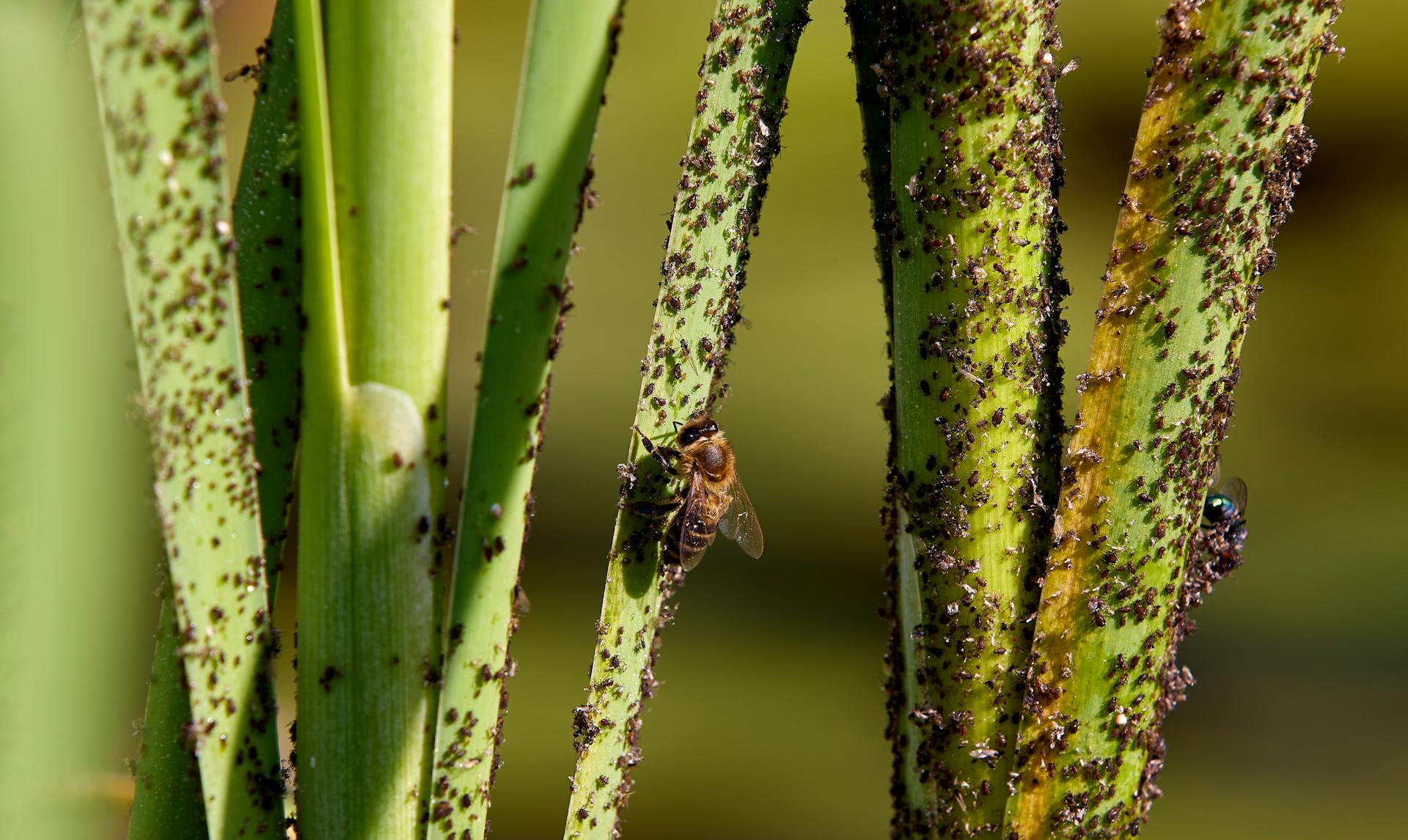
Worms from dogs can be a real concern for dog owners and their families. You can catch worms from dogs through contact with contaminated feces or contaminated soil, water, or food.
Some common types of worms that can be transmitted from dogs include hookworms, roundworms, and tapeworms. These parasites can cause a range of symptoms, from mild discomfort to severe illness.
If you're around a dog that has worms, it's essential to take precautions to avoid getting infected.
How Dogs Get Worms
Dogs can get worms in various ways, and it's essential to understand these methods to prevent infestations.
Puppies can be born with roundworms, which are transmitted from their mother through the placenta or nursing. This is a common occurrence, and even healthy, well-cared-for mother dogs and puppies can be affected.
The canine roundworm has a unique way of propagating itself, leaving dormant larvae in the mother's body tissues even after treatment. These larvae can reactivate during pregnancy and be passed to the puppies, either in the womb or through her milk.
Here are some common ways dogs get worms:
- From their mother, either through the placenta or nursing
- From the environment, by ingesting eggs from soil, plants, or objects
- From eating infected animals, such as rodents, earthworms, birds, or insects
It's worth noting that many heartworm preventives also control roundworms, making them a valuable tool in preventing infestations.
Preventing Intestinal Parasites in Humans
Contact with contaminated soil or dog feces can result in human ingestion and infection. This is a significant risk, especially for children who love to play outside.
To minimize the risk, it's essential to keep your yard and home clean. Regularly remove and dispose of dog feces, and consider using environmental flea control to rid your house and yard of fleas.
Frequent hand washing is also crucial, especially after handling dog feces or coming into contact with soil that may have been contaminated. Good hand hygiene can go a long way in preventing the spread of intestinal parasites.
If you have pets, it's also a good idea to prevent them from eating wild animals that may carry roundworms. This can help reduce the risk of transmission to your family members.
Here are some additional strategies to prevent the spread of intestinal parasites:
- Prompt removal and disposal of feces
- Keeping dogs on monthly dewormer
- Routine deworming of puppies
- Preventing dogs from eating rodents
- Good hand hygiene
- Preventing children from playing in areas where pets or other animals defecate
By following these simple steps, you can significantly reduce the risk of intestinal parasites in your family and help keep your loved ones healthy.
Causes and Prevention
Dogs can get roundworms from their mother, either before they're born or while nursing. This is a common way for puppies to become infected.
Puppies can be born with roundworms because the larvae are often transmitted from the mother just before birth or through nursing. The larvae can remain dormant in the mother's body for the rest of her life, unless she becomes pregnant again.
If a dog has ever had roundworms, dormant larvae can remain in its body tissues, even if the adult worms are eradicated. These larvae can reactivate and be passed to her puppies during pregnancy.
Puppies can become infected with roundworms by ingesting the parasite's eggs, which can be found in feces-contaminated soil and other contaminated objects. They can also get infected by eating a rodent that's already infected with roundworms.
Here are the common ways dogs get roundworms:
- From their mother
- From the environment (ingesting eggs from soil or contaminated objects)
- From eating infected animals (such as rodents)
To prevent roundworms, it's essential to maintain a clean environment, remove feces regularly, and prevent dogs from eating wild animals that may carry roundworms. Many heartworm preventives also control roundworms, so be sure to talk to your veterinarian about prevention and treatment choices for your dog.
Symptoms and Diagnosis
Symptoms of roundworms can be quite alarming, especially in puppies. Roundworms can live in the intestines, depriving the puppy or dog of nutrients from their food, leading to symptoms of malnutrition such as weakness, weight loss, and stunted growth.
A potbellied appearance is another common symptom of roundworms, especially if the infestation is left untreated. The parasites can multiply quickly in the intestines, giving the puppy a noticeable potbelly.
In addition to these symptoms, roundworms can also cause coughing, vomiting, diarrhea, and even pneumonia in severe cases. If you see one or more roundworms in your dog's vomit or stools, it's essential to contact your vet immediately.
Take a look at this: Can My Puppy Meet Other Dogs
Here are some common symptoms of roundworms in dogs:
- Malnourishment (weakness, weight loss, and stunted growth)
- Potbellied appearance
- Coughing
- Vomiting or diarrhea
- Worms vomited up or visible in stools
Diagnosing roundworms is relatively straightforward. Your veterinarian can look at a fecal sample from your puppy or dog under a microscope to check for the presence of roundworm eggs.
Whipworms
Whipworms can be a real problem for dogs, and it's essential to understand how they're contracted. Dogs get whipworms by ingesting infective eggs.
These eggs can survive in the soil for up to five years, which is a long time. Whipworm eggs are often found in the soil where dogs have been.
Dogs may show symptoms such as diarrhea, weight loss, and bloody stools. Whipworm infestations can be challenging to diagnose due to the eggs' long survival period in the environment.
If left untreated, whipworm infestations can lead to serious health issues in dogs.
Expand your knowledge: How Long Can a Dog Smell Another Dogs Scent
Symptoms of Roundworms
Symptoms of roundworms can be quite alarming, especially for puppies. Puppies are more likely to experience clinical signs due to their developing immune system.
Roundworms can cause malnourishment in dogs, leading to weakness, weight loss, and stunted growth. This is because the worms live in the intestines, depriving the dog of nutrients from its food.
A potbellied appearance can be a sign of a severe roundworm infection. This occurs when the parasites multiply quickly in the intestines and grow to the point where numerous adult worms are present.
Coughing and other respiratory symptoms can also occur due to roundworm larvae migrating to the lungs. In some cases, this can lead to serious conditions such as pneumonia.
Dogs with roundworms can experience digestive upsets like vomiting and diarrhea. Diarrhea can range from mild to severe.
Here are some common symptoms of roundworms in dogs:
- Diarrhea
- Vomiting
- Pot-bellied appearance
- Poor coat quality
- Weight loss
- Stunted growth
Diagnosis
Diagnosis is a crucial step in identifying roundworm infestations in dogs. A microscope is used to examine a dog's stool sample for the presence of eggs.
Pet owners may also spot adult worms in their dog's stool or vomit, which can be a clear indication of a roundworm infestation. This can be a disturbing sight, but it's essential to act quickly to prevent further complications.
You might like: Can You Hurt a Dog's Feelings?

A fecal test called an antigen test can be helpful in detecting roundworms, especially if the dog has a low number of eggs in their stool. This test can provide a more accurate diagnosis than a simple stool examination.
Your veterinarian can examine a fecal sample under a microscope to check for roundworm eggs. A fecal exam is usually part of a puppy's first vet visit, as roundworms are extremely common in young dogs.
If a roundworm infestation is light, the fecal sample may not include any eggs. Experts recommend treating young puppies routinely every few weeks, assuming the presence of roundworms until proven otherwise.
Here's a summary of the common methods used to diagnose roundworm infestations:
- Microscope examination of a stool sample for eggs
- Visual inspection of stool or vomit for adult worms
- Antigen test for detecting roundworms, especially in cases with low egg counts
Gastroenteritis Transmission
Gastroenteritis, or an upset stomach, can be spread between people and their pets. The symptoms in both humans and animals can be similar, including fever, lethargy, nausea, vomiting, abdominal pain, diarrhea, and weight loss due to fluid loss.

A common way for gastroenteritis to be transmitted between dogs and people is through their stool or even saliva. Pet waste from both sick and healthy pets can be a source of infection for people.
The FDA warns that dogs can spread the bacteria that cause gastroenteritis through kisses or stool accidents inside the home. It's essential to keep your home clean and hygienic to reduce the risk of transmission.
To minimize the risk of gastroenteritis transmission, it's crucial to pick up after your dog right away in yards and outdoor areas. You should also wash your hands frequently, especially after handling your dog's feces or coming into contact with contaminated soil.
Here are some common ways dogs can spread gastroenteritis to humans:
- Contaminated food and treats
- Contaminated water bowls or surfaces
- Direct contact with stool or saliva
- Scratches, cuts, or bites that break the skin
Frequently Asked Questions
Do I need to treat my house if my dog has worms?
Yes, if your dog has worms, your house may also be infested with fleas, which can spread the infection. Treating your house is essential to prevent further spread and ensure your dog's recovery.
How fast can humans get worms from dogs?
Humans can become infected with canine roundworms within two weeks of ingesting contaminated dog feces or worm eggs. Accidental ingestion can lead to the worms migrating to various organs, posing serious health risks.
Sources
- https://www.thesprucepets.com/are-worms-in-dogs-contagious-6835486
- https://www.healthline.com/health/humans-catching-from-dogs
- https://www.vet.cornell.edu/departments-centers-and-institutes/riney-canine-health-center/canine-health-information/roundworms
- https://www.petsandparasites.org/dog-owners/roundworms
- https://www.akc.org/expert-advice/health/roundworms-in-dogs-symptoms-treatment-and-prevention/
Featured Images: pexels.com


